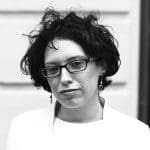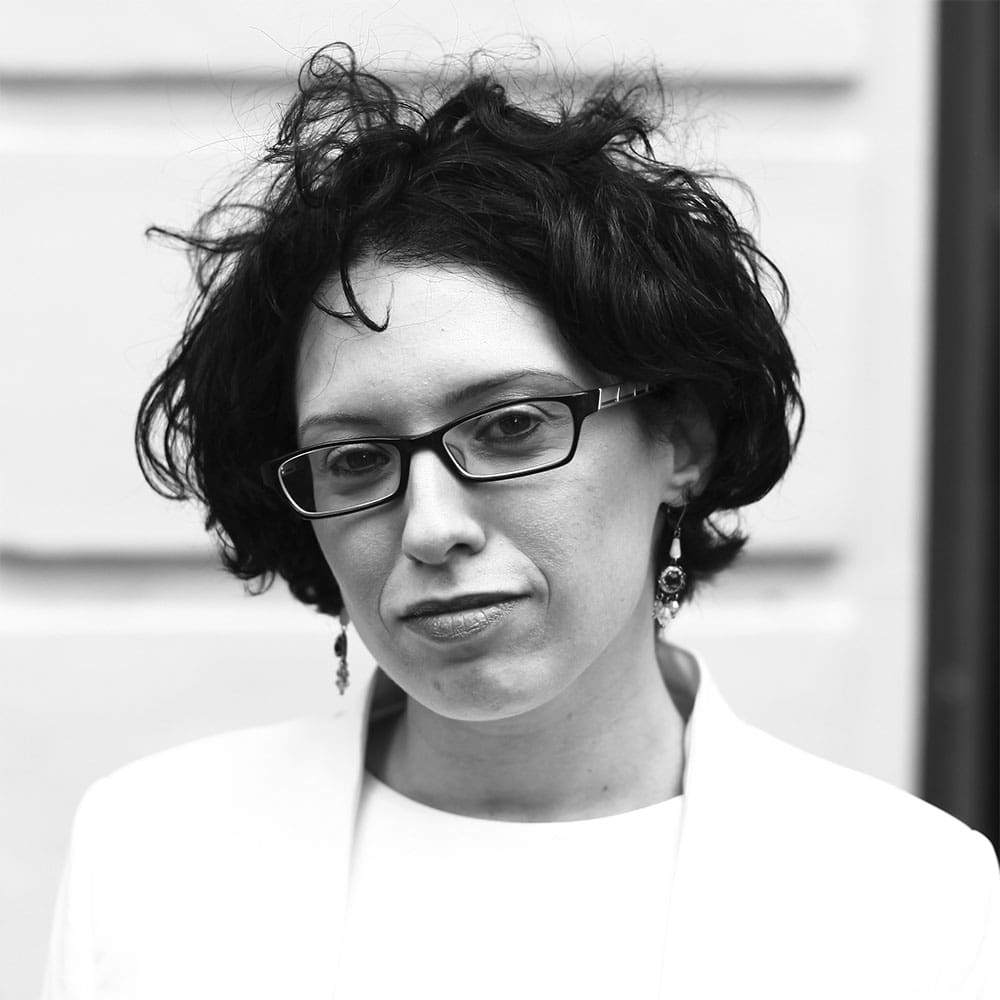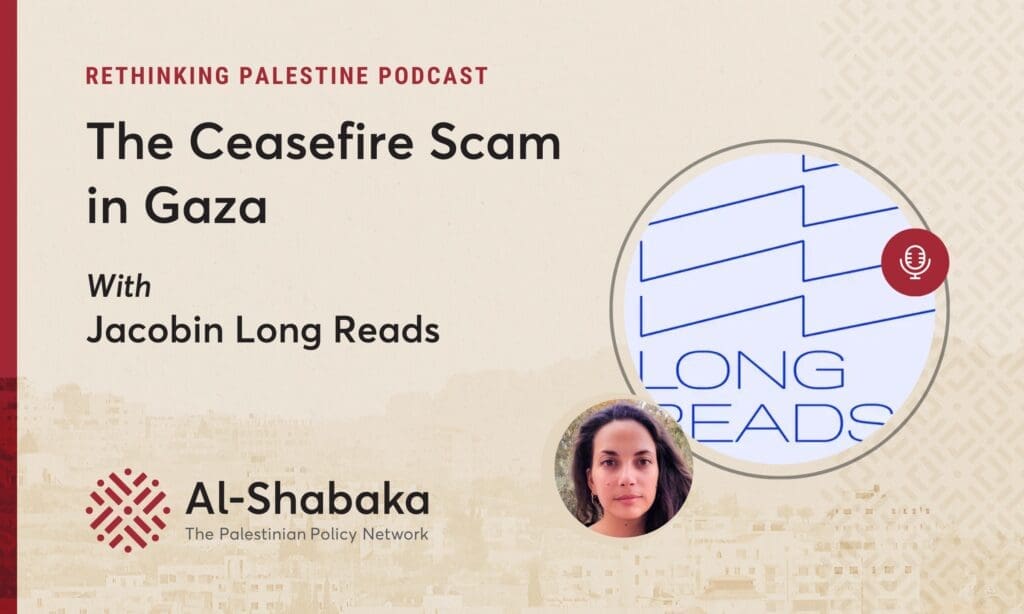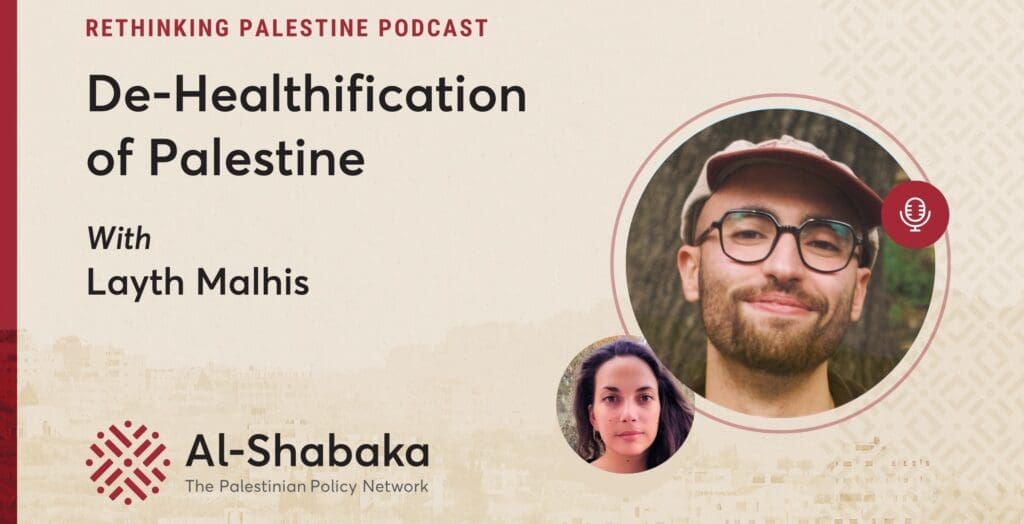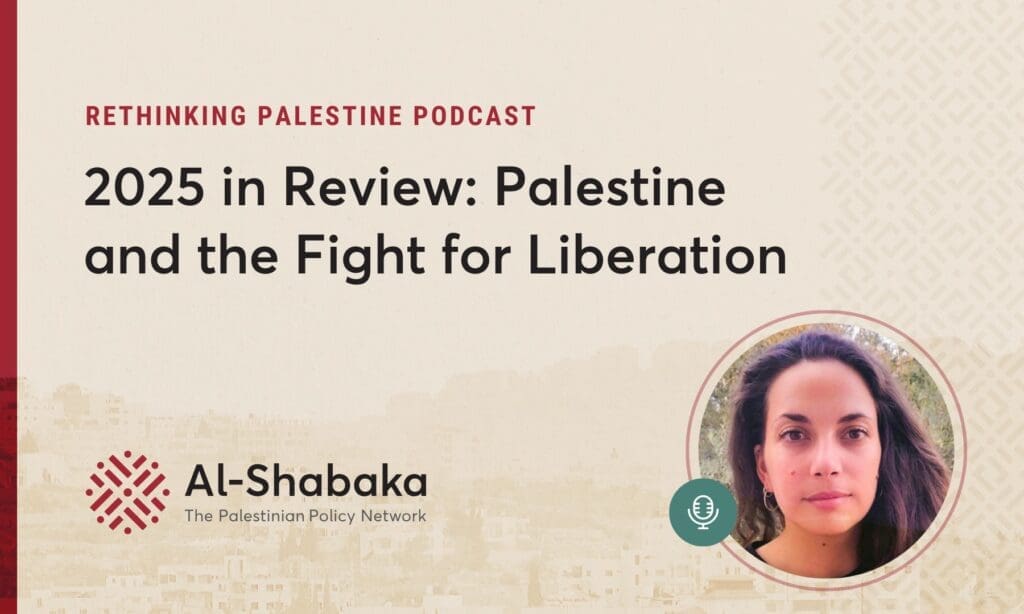About This Episode
Episode Transcript
The transcript below has been lightly edited for brevity and clarity.
Lana Tatour 00:00
Through seemingly radical discourse, for example, apartheid is being reconfigured from a colonial question into a liberal question. So the problem is the lack of equality; it is not colonization; it is not Zionism as a racist, settler colonial movement.
Yara Hawari 00:27
This is Rethinking Palestine, a podcast from Al-Shabaka: The Palestinian Policy Network, a virtual think-tank that aims to foster public debate on Palestinian human rights and self-determination. We draw upon the vast knowledge and experience of the Palestinian people, whether in Palestine or in exile, to put forward strong and diverse Palestinian policy voices. In this podcast, we will be bringing these voices to you so that you can listen to Palestinians sharing their analysis, wherever you are in the world.
Apartheid as a framework has long been used to describe the situation in Palestine, from the Jordan River to the Mediterranean Sea. It has a long history in Palestinian discourse and intellectual production, forged by the solidarity with the black struggle in South Africa and recognition of very similar structures of oppression. But it particularly became popular after the fall of the apartheid regime in South Africa, because it presented a successful model of struggle and a way out. It’s definition by the Rome Statute of the International Criminal Court in 2002 is as follows: Inhumane acts “committed in the context of an institutionalized regime of systematic oppression and domination by one racial group over any other racial group or groups and committed with the intention of maintaining that regime.”
Since then, the apartheid framework has heavily relied on the rights discourse, which presumes the centrality of international law, and therefore the notion that justice will be achieved with the application of said law. But apartheid wasn’t always understood in these terms, and the history of the term and its application on the situation in Palestine has a more radical understanding – one that recognizes and seeks to dismantle the ongoing Zionist settler colonial project.
To discuss all of this and a lot more, I’m joined by Dr. Lana Tatour, a lecturer in Development at the University of New South Wales in Sydney. Her work focuses on settler colonialism, indigeneity, race, human rights, and Palestine, among many other things. Lana, thank you so much for joining me on Rethinking Palestine.
Lana Tatour 02:37
Thank you for having me.
Yara Hawari 02:39
So I wanted to start by asking you if you can briefly talk us through the radical history of the use of the term “apartheid,” and perhaps juxtapose it with the more recent liberal uses?
Lana Tatour 02:50
So, as you mentioned, there is a radical history to the concept of apartheid, and that radical history certainly exists in relation to Palestine. But not only in relation to Palestine, also in relation to the anti-apartheid struggle. And we need to remember the context of the struggle, definitely in the 50s and 60s and part of the 70s, where the Third World movement for liberation was very strong. South Africa was a big part of this, the anti-apartheid campaign in South Africa was a big part of that movement, and so is the Palestinian liberation struggle and the Palestinian Liberation Organization.
We also need to remember that, even though international law has come to be shaped by liberal discourses and liberal frameworks, there is also a Third World agency in the making of international law. So if we look at the International Convention on the Suppression and Punishment of the Crime of Apartheid, which was adopted in the 70s, we can’t really understand how this convention came to be without looking at the historical context of Third World agency and pressure from within the UN to adopt the convention – again, against the agenda of Western countries.
Now bringing that to Palestine, tying the analogy with apartheid and the analogy with South Africa was always dominant, and Palestinians always understood their struggle in both anti-colonial and anti-racist terms. Edward Said, for example, clearly said, ” We are clearly anti-colonialist and anti-racist in our struggle.” It was clear that you cannot discuss colonialism without racism, and that race is central to the colonial project. And similarly, in the Second Conference of Heads of State or Government of the Non-Aligned C ountries, we can see an understanding of the question of Palestine by the Third World as one that connects to colonialism and racism. One of the lovely quotes there, again: They extended their “full support to the Arab people of Palestine in their struggle for liberation, from colonialism and racism.”
And again, Yasser Arafat in his famous speech – the gun and olive branch speech – in 1974 also was talking about Zionism as an ideology that is imperialist, colonialist and racist, and that is a quote. He referred to Israel as a racist entity founded on imperialist, colonialist concepts, and he tied the liberation of Palestine to the liberation of other people. I’m again quoting, and he said, “Our resolve is to build a new world, to fortify the world free of colonialism, imperialism, neocolonialism and racism, in each of its instances, including Zionism.”
So there is a radical history to the concept, one that does not bring apartheid instead of colonialism or instead of imperialism, but one that understands the imperial and the colonial and the settler colonial project as intertwined with racial politics. They would talk about apartheid and Zionism, so apartheid was not a replacement to Zionism.
Yara Hawari 06:47
Thanks, Lana, that’s a really important point to note that apartheid can’t be a standalone concept. It’s not mutually exclusive. And in that sense, that radical history really helps us understand that.
I think one of the useful things that happened with the ICC definition is that under international law, apartheid became universally applicable and thus challenged the misconception that apartheid in South Africa was an exceptional case that has since ended. So it allows us an understanding of apartheid as a system that can adopt various characteristics and manifest itself in various ways. And this can also have a retroactive application.
But of course, as you’ve said recently in various analysis and social media posts, international law isn’t everything. So why and how should an understanding of Palestine go beyond international law?
Lana Tatour 07:43
I think the point about apartheid being a crime against humanity is very important, and it explains why apartheid as a framework in international law is so appealing to activists and to scholars and to everyone who wants to advance the Palestine cause. The occupation framework, which is another framework under international law can’t go as far in the context of Palestine, it assumes that the occupation is temporal and it covers only the West Bank and Gaza. So apartheid in that sense allows us to speak about historic Palestine, about the system of control – the racial system of control, the colonial system of control – that exists between the river and the sea. So in that sense, apartheid as a crime against humanity is a powerful legal framework, and this is something that we certainly need to mobilize.
Having said that, we need to be careful in how we understand apartheid, because we can have different understandings of apartheid. So what I described before is a particular genealogy for thinking about apartheid and the history of the use of apartheid in the Palestinian context. Another trend that we are seeing is actually a liberal reading of apartheid. I know it sounds slightly counter-intuitive in a sense, but the idea is that we see apartheid merely as a question of equality – as a liberal question of equality – or inequality that exists between people, rather than a colonial question. And I think this is what we have been seeing with the intervention that Peter Beinart made a few months ago, when he was calling for one binational state. And he was constantly referring to South Africa. But he was referring to it as an instance of inequality that could be remedied by equality. And similarly, B’Tselem’s report that was just released, calling Israel an apartheid regime, has a very particular reading of apartheid – one that doesn’t take settler colonialism, imperialism and race into consideration. So apartheid, even when they call Israel apartheid, if you look at the report, they don’t even mention racism, and they distinguish the apartheid in Palestine from South Africa, saying the apartheid in South Africa was based on race, while in Palestine on nationalism.
So in many ways this understanding of apartheid that is becoming quite dominant in particular liberal circles, especially among some progressive liberal Zionists like Beinart or the radical Israeli left, we are seeing a reworking of the framework of apartheid in a way that goes against the intellectual legacy and the activist legacy and history of the Palestinian struggle, and of the understanding of apartheid in relation to Palestine – but not only in relation to Palestine, again, also in relation to the ways in which the Third World liberation movement understood it.
Yara Hawari 11:39
If you’re enjoying this podcast, please visit our website, www.al-shabaka.org, where you will find more Palestinian policy analysis, and where you can join our mailing list and donate to support our work.
Absolutely, and as you so eloquently said, one of the dangers of this more recent understanding of apartheid is the admittance – or the sidelining – of Israel as a settler colonial entity. And we see this even from Palestinians, themselves, and Palestinian organizations and institutions. I think this is best epitomized in the calls for equality, rather than the calls for decolonization. And I know that this is something that you’ve been talking and writing about, so I was wondering if perhaps you could expand a little on that very call for equality as opposed to decolonization?
Lana Tatour 12:35
You’re absolutely right, and this is what is happening. The Palestine question is being, through seemingly radical discourse – for example, apartheid – is being reconfigured from a colonial question into a liberal question, and more specifically into a liberal question of equality. So the problem is the lack of equality; it is not colonization; it is not Zionism as a racist settler colonial movement, but rather the lack of equality between Jews and Palestinians. And then the answer to the question of Palestine becomes one of liberal equality, right? So it could be remedied by extending citizenship, for example, to all Palestinians. Or it could be remedied by ensuring some forms of civil equality, civil rights, et cetera. It just becomes a civil rights movement rather than a movement for decolonization, and rather than thinking about Palestine in terms of decolonization.
Yara Hawari 13:47
Even when decolonization is discussed in so many spaces, it’s often done so on a very shallow level, reducing it to a metaphor, as scholars Eve Tuck and K. Wayne Yang wrote in their seminar paper, Decolonization is Not a Metaphor. But of course decolonization, although a really big site for discussion and imagination, is essentially about the repatriation of indigenous life and land.
Lana Tatour 14:17
Absolutely. And that kind of trend, of reformulating decolonization also in liberal terms, is not something that is happening only in Palestine.
So I want to give an example from a webinar, I participated in with some liberal Zionists present. It was Peter Beinart and Professor Shaul Magid. I was pressing on the decolonization, not only liberal equality, and at some point Shaul Magid was saying, We agree! You want to call it ‘decolonization’? Fine. And I thought that captured, really, some particular sensibility that is happening, where decolonization can be framed in different ways, but we will call it decolonization. And I think this is the tricky part in which Palestinians are finding themselves.
What we are seeing, because of the effectively one-state condition, is that we can understand decolonization in different ways, and some are giving liberal interpretation to decolonization. And some of the things we are facing as Palestinians is the increasing use of radical frameworks, right? Apartheid, decolonization. But the interpretations that are given to these frameworks and to these discourses are very problematic. And then we are asked, Why are you complaining? We are talking about apartheid. We are talking about decolonization. And this is where there needs really to be insistence, as you said, that decolonization is not a buzzword. It is not a metaphor. It is not a code word for liberal equality. It is an actual project of dismantling settler colonialism.
How does dismantling settler colonialism look like is the challenge that we have. But this challenge is being constantly met by Palestinians, who are constantly thinking and rethinking how decolonization can look like. And I want to bring here the example of the Palestinian Youth Movement, for example, who had a delegation and traveled to South Africa to study about apartheid and to study about decolonization, to look at the challenges that South Africa is facing after the dismantling of apartheid, and realizing that decolonization is a process that didn’t end in one moment. It didn’t end with the dismantling of apartheid, because apartheid continued – the legacies of apartheid continue to shape the political, social, cultural, economic realities of South Africans.
So, when we talk about decolonization, we’re really talking about a project of dismantling the logics of settler colonialism – the institutions, the structures – and thinking about a commitment to anti-capitalism, land, wealth distribution, and dismantling other forms of intersectional violence. But my point with this example is that Palestinian activists are engaged in a process of trying to think about how decolonization can look like, and how we can understand decolonization.
But one thing we need to insist is that decolonization cannot mean liberal equality. It is not about extension of citizenship – we have this kind of model, it’s called the Palestinian citizens of Israel, and we know the extension of citizenship does not eliminate colonial subjugation. It does not necessarily provide equality. Because even if your aim is equality, to really achieve equality you need the anti-colonial project.
Yara Hawari 18:47
I think it’s easy for Palestinians to fall into this trap of the liberal equality model, particularly in the West Bank and Gaza, where we’ve seen a process of NGO-ization, which has completely de-politicized a lot of Palestinian thinking and a lot of Palestinian imagination. So I think that trap is definitely an easy one that we, unfortunately, have to get ourselves out of.
Now, Lana, you mentioned earlier the main human rights organization in Israel, B’Tselem, came out with a report on apartheid, declaring Israel as an apartheid regime from the river to the sea. It received a lot of media attention and it was really welcomed by human rights groups across the board. I think it’s important to note that there have been other reports: Of course, there was the ESCWA report, which was compiled by Richard Falk and Virginia Tilley; there was also the work of Palestinian organizations, including Al Haq and Adalah; and also a lot of activists and academics in Palestine have written about apartheid. It does definitely signify a shifting discourse in certain circles.
But I think there’s another side to this story: That Palestinians and Palestinian organizations have been talking about this for a long time. And what it feels like is that, when we say it, it’s ignored or deemed extreme, and that we literally need an Israeli or an Israeli organization to say it, to legitimize it in the eyes of the international community. So I think this isn’t just about apartheid as a framework, but also about knowledge production and discourse in Palestine in general. As Palestinian academics and activists, thinkers, et cetera, we know far too well that an Israeli voice or another non-Palestinian voice is nearly always needed to legitimize and confirm our lived experiences of settler colonialism, military occupation, and apartheid.
And this reminds me of a poem by the writer and artist, Grada Kilomba, who wrote:
When they speak, it is scientific; when we speak, it is unscientific…
When they speak, it’s objective; when we speak, it’s subjective;
When they speak, it’s neutral; when we speak, it’s personal;
When they speak, it’s rational; when we speak, it’s emotional.
How would you encourage allies, comrades to not fall into this trap of monopolizing the conversation on Palestine and minimizing Palestinian voices at the same time?
Lana Tatour 21:33
First of all, that quote just captures that racial politics. And before moving to talking about what comrades can do, I think one of the ironic issues with all the attention that B’Tselem is getting, is that that attention shows how much of the politics – it shows a particular apartheid or racial politics that also underpins a global civil society. So, ironically, B’Tselem is speaking about apartheid while overriding Palestinian voices, while disregarding how Palestinians have understood apartheid. I’ll be interested to know who has written the report, and I’m quite certain that the report was written by Israeli Jews. Israeli human rights organizations – and this is something we need also to talk about – they are capitalizing on that global politics that renders their voices more valuable than Palestinian voices. This is where, when we think about decolonization, we need also to think about decolonization as daily praxis. I don’t think in this regard B’Tselem is doing a very good job at that, looking at decolonization as a daily praxis.
But, generally, we are constantly seeing this dynamic, and we’re constantly seeing the undermining of Palestinian voices. I think what comrades and solidarity groups can do is keep reminding, not bringing voices, but being reminded and keep reminding how Palestinians understand their own reality – that when a Palestinian organization issues a report, they give it the importance that they are giving to the B’Tselem report. And also in the activist circles, often when you want to get your point across, you find some allies referring to Israeli organizations or Israeli scholars, because it would sound better to a liberal international audience. And what we constantly need to do is resist – the fact that it sounds better doesn’t mean that we need to follow that dynamic.
The question is, how do we dismantle the dynamics? This really needs to be our responsibility, our allies’ responsibility: to center Palestinian reading of their own reality, but also holding Israelis – whether they’re human rights organizations or sympathetic scholars – accountable when they erase Palestinian voices or override Palestinian mobilization on the same issues. I think it’s really important to hold them accountable, because one of the things that I identify is this sense of self-righteousness that is surrounding these kinds of conversations among Israelis. We constantly need to dismantle these dynamics in our activism and, again, hold them accountable.
Yara Hawari 25:30
Thanks, Lana. I think you really summarized it beautifully, the decolonization as daily praxis. In other words, it’s not just about the discursive, the abstract; it’s also very much about how you live your life in the present, and that means centering Palestinians in your work and centering Palestinian lived experience, and recognizing that Palestinian voices can’t be replaced, not even by allies and well-intentioned people.
I think for Palestinians, it really does mean resisting the urge to present Israeli voices to backup our own lived experience, to back up our own analysis. And it’s really part of the struggle, because we’re working against a whole system, a whole knowledge production system, which deems our voices illegitimate or less valuable than others.
Lana, thank you so much for joining me today to discuss this really important topic. It was an absolute pleasure.
Lana Tatour 26:34
Thank you so much. It was, absolutely.
Yara Hawari 26:43
Thank you for listening to Rethinking Palestine. Don’t forget to subscribe and leave us review. For more policy analysis and to donate to support our work, please visit our website: www.al-shabaka.org. You can also follow us on Facebook and Twitter.
Al-Shabaka: The Palestinian Policy Network is an independent, non-partisan, and non-profit organization whose mission is to convene a multidisciplinary, global network of Palestinian analysts to produce critical policy analysis and collectively imagine a new policymaking paradigm for Palestine and Palestinians worldwide.
Lana Tatour is a Lecturer in Development at the School of Social Sciences, UNSW Sydney. She works on settler colonialism, indigeneity, race, citizenship, human rights, and the Middle East with a focus on Palestine and Israel. Prior to joining the School of Social Sciences, she was a Postdoctoral Fellow at the Center for Palestine Studies at Columbia University, and held visiting fellowships at the Palestinian-American Research Center, the Australian Human Rights Centre, UNSW Faculty of Law and UNSW School of Social Sciences. She is on the board of The Australian Journal of Human Rights. She is currently working on her manuscript Ambivalent Resistance: Palestinians in Israel and the Liberal Politics of Settler Colonialism and Human Rights, and on an edited volume together with Dr Ronit Lentin on Race and the Question of Palestine.










